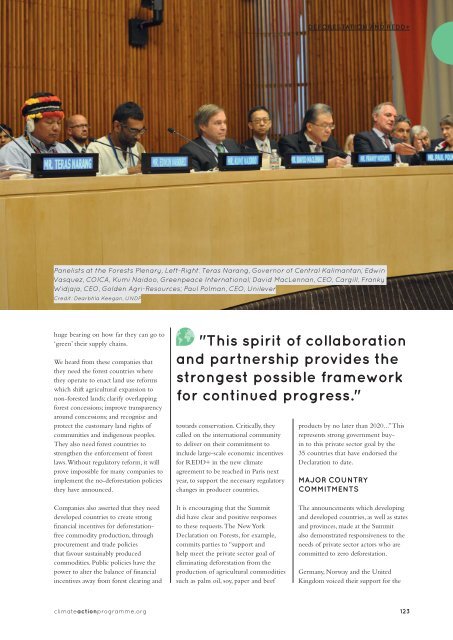Climate Action 2014-2015
You also want an ePaper? Increase the reach of your titles
YUMPU automatically turns print PDFs into web optimized ePapers that Google loves.
DEFORESTATION AND REDD+<br />
Panelists at the Forests Plenary, Left-Right: Teras Narang, Governor of Central Kalimantan; Edwin<br />
Vasquez, COICA, Kumi Naidoo, Greenpeace International; David MacLennan, CEO, Cargill, Franky<br />
Widjaja, CEO, Golden Agri-Resources; Paul Polman, CEO, Unilever<br />
Credit: Dearbhla Keegan, UNDP<br />
huge bearing on how far they can go to<br />
‘green’ their supply chains.<br />
We heard from these companies that<br />
they need the forest countries where<br />
they operate to enact land use reforms<br />
which shift agricultural expansion to<br />
non-forested lands; clarify overlapping<br />
forest concessions; improve transparency<br />
around concessions; and recognise and<br />
protect the customary land rights of<br />
communities and indigenous peoples.<br />
They also need forest countries to<br />
strengthen the enforcement of forest<br />
laws. Without regulatory reform, it will<br />
prove impossible for many companies to<br />
implement the no-deforestation policies<br />
they have announced.<br />
"This spirit of collaboration<br />
and partnership provides the<br />
strongest possible framework<br />
for continued progress."<br />
towards conservation. Critically, they<br />
called on the international community<br />
to deliver on their commitment to<br />
include large-scale economic incentives<br />
for REDD+ in the new climate<br />
agreement to be reached in Paris next<br />
year, to support the necessary regulatory<br />
changes in producer countries.<br />
products by no later than 2020...” This<br />
represents strong government buyin<br />
to this private sector goal by the<br />
35 countries that have endorsed the<br />
Declaration to date.<br />
MAJOR COUNTRY<br />
COMMITMENTS<br />
Companies also asserted that they need<br />
developed countries to create strong<br />
financial incentives for deforestationfree<br />
commodity production, through<br />
procurement and trade policies<br />
that favour sustainably produced<br />
commodities. Public policies have the<br />
power to alter the balance of financial<br />
incentives away from forest clearing and<br />
It is encouraging that the Summit<br />
did have clear and positive responses<br />
to these requests. The New York<br />
Declaration on Forests, for example,<br />
commits parties to “support and<br />
help meet the private sector goal of<br />
eliminating deforestation from the<br />
production of agricultural commodities<br />
such as palm oil, soy, paper and beef<br />
The announcements which developing<br />
and developed countries, as well as states<br />
and provinces, made at the Summit<br />
also demonstrated responsiveness to the<br />
needs of private sector actors who are<br />
committed to zero deforestation.<br />
Germany, Norway and the United<br />
Kingdom voiced their support for the<br />
climateactionprogramme.org 123












